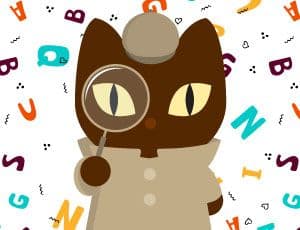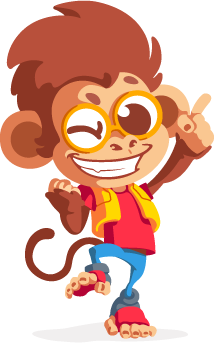Escola Games | Jogos Educativos
https://www.escolagames.com.br
Teacher's support sheet

Word Hunt
It’s time to go word-hunting! The Word Hunt game gives you options among many scrambled letters. You need to help Cat the Detective encounter the correct words in each phase. Choose a category and find all of the words. There are many categories, such as animals, food, objects, and many others. Let’s have fun!

Teacher's tips
Level of Education: Elementary School
Subject: English
Theme: Analysis and thinking on the language - Orthography - Means of transportation - Mammals - Food
Age: 6 to 9 years old
In the literacy process, the kid faces many attractions (letters, words, sentences, texts) and engages best if they can fully participate. An online word search is an essential didactic tool since students have to spell the words while looking for them and associate letters to their sounds in words. [FIM-DICA]
Learner outcomes
To recognize conventional writing;
To view the usage of the alphabet in the word formation process;
To compare words;
To make sense of the word structure process;
To organize letters to form words;
To distinguish the alphabet letters;
To improve reading and writing skills;
To develop attention, motor coordination, and focus;
To identify the handwriting of common words using the word search;
To reinforce content discussed during the classes;
To correlate the themes of the word search with topics discussed during classes.
Teachers' goals
To improve logical thinking;
To enable students to improve their reading skills;
To promote the words' structure comprehension process;
To widen students' vocabulary;
To teach the word formation process;
To favor their comprehension of the word formation process;
To develop attention and focus;
To reinforce content discussed during the classes, relating them to the themes in the game.
Suggestions of approaches for the teacher
(Approach 1) Ask students to write the words they find in their notebooks.
(Approach 2) The teacher can ask students to circle the initial and final letters of words.
(Approach 3) Play scramble: Write on the board different words with scrambled letters. Then encourage students to organize them and form words.
(Approach 4) On colored plastic cups write different letters and ask students to form words.
(Approach 5) Illustrated dictation: show students pictures for them to write the corresponding words.
(Approach 6) Use a movable alphabet to form words. You can also make it with pet lids.
(Approach 7) Cut letters and phrases from magazines and ask students to form words and sentences with them.
(Approach 8) Play stop.
(Approach 9) Illustrated dictation: Put some objects inside a box. Each student should take one, and all of them should write the objects' names on their notebooks.
(Approach 10) Form phrases with the word search words.
(Approach 11) Look in the dictionary for the words students find on the word search.
More about the content
CONTEXTUALIZING THE LUDIC IN THE CLASSROOM: THE IMPORTANCE OF PLAYING IN EARLY CHILDHOOD EDUCATION BETWEEN 03-05 YEARS
The theorists presented in this study, Antunes (2012), Kishimoto (2006, 2011), G. Brougère (2010), Linn, Susan (2010) and among other scholars reveal that toys and games provide moments of great joy, In addition to being a social fact that allows children to learn in a pleasant and healthy way, it is through play that they can learn about different paths, for coexistence in society and the construction of new knowledge, and it will certainly be through playing that they are educated. resilient subjects. Playfulness in early childhood education enables meaningful, creative and inventive learning, as it provides the exchange of knowledge in a pleasant way in which the child can understand the rules during play and, certainly, they are activities that promote skills, physical, cognitive, motor, in addition to contributing to acceptance and respect for norms, contributing to social life, affectivity, creativity and the relationship with oneself and with others, gradually providing the formation of participatory, reflective, active, cooperative beings, occupying their place in society, in addition to favoring freedom, autonomy, knowing only that they are playing. Playing is important because it boosts learning processes, developing imagination and invention, intensifying and allowing development, promoting growth through play, helping in the teaching-learning process. Toys and games are essential in children's lives, because those who play develop and grow with more freedom, building a branched world of possibilities, side by side with the ludic.
It is argued that, at first, the child serves as a toy for the adult, in which they play with them, giving rise to a playful action and, with this attitude, the game is being built and the child gradually learns to play, entering the game and, therefore, their behaviors and discoveries originate in this culture as a whole, and learning occurs precisely when understanding and mastering, and then the child plays, interacts, communicates with the other and then reproduces the previous experience, carrying the development motor, sociocognitive – emotional and affective. It is known that toys are part of the child's daily life and, since ancient times, it has contributed to the development of humanity that over time gained colors, shapes and textures, a manipulable object that children love to interact with, it is certainly in play that feeds children's intelligence and, probably, their perspectives, providing opportunities for new relationships and interaction in the environment that surrounds them. In addition, games are very important tools to be offered to the subject from an early age, especially in early childhood education. (BROUGÉRE, 2020). The playful culture cannot be forgotten, it must be inserted in the school space, and come full of meaning, as well as represented by playing. It is necessary for the professional who works with younger children to keep in mind how relevant play is in the teaching-learning process, understanding and understanding that the exchange of knowledge based on play motivates and encourages the child to learn and develop joking, that playfulness will not be just a simple game, but it permeates playing. The playful role favors fun, joy and pleasure, the toy is the mediation of any learning that satisfies the subject in his growth, feeding his universe and contemplating the learning process, gradually allowing the construction of criticality. (KISHIMOTO, 2011). Based on the National Curricular Reference for Early Childhood Education, when it says that “playing favors children's self-esteem, helping them to progressively overcome their acquisitions in a creative way”.The teacher of this age group must realize that play is essential in the child's development in all aspects and not limited to working it in the classroom. Therefore, we list the following question: What is the Importance of Playing in Early Childhood Education? It is known that children like to play, so the teacher must resort to their creativity, developing playful activities, because it is in playing that the child learns to live in a group in solidarity, strengthening bonds of friendship and expanding their knowledge of the world. And probably, building a path of trust with the other, taking the experiences lived over time. Playing is a path that does not choose an age group, on the contrary, children interact amid so much play and toys, it is analyzed that playing is children's language that gives rise to ideas with children and in this way, they learn by playing , since this phenomenon in the hand of a child is never something finished, it usually gives rise to a new activity, or even another toy, it is noticed that the playful culture is the focus of union between the children's universe and enabling the strengthening of friendships, the construction of values, experiences, harmonious coexistence and affection for the other person. Toys and games are of great value in people's lives, especially younger children, because those who develop while playing grow and learn happily. It appears that playing proposes new possibilities to the subject, who seeks to participate and interact with the environment in which he is a part, play is a culture that emerged side by side with the evolution of society and certainly continues to advance today.
NASCIMENTO, Josefa de Barros Barbosa do. SILVA, Miriam Maria da. MARONES, Bruno. Contextualizing the ludic in the classroom: the importance of playing in early childhood education between 03-05 years. Revista Científica Multidisciplinar Núcleo do Conhecimento. Year. 06, Ed. 10, Vol. 01, p. 72-95. October 2021. ISSN: 2448-0959, Access link: https://www.nucleodoconhecimento.com.br/education/contextualizing-the-ludic
In this activity, the teacher must know all the words they can find in the word search in all the categories. To play it, students must be capable of sharing their ideas about the themes (animals, food, means of transportation, or mammals).
They can play it in groups or individually. The teacher can relate it to a topic discussed during classes or as English content to help them with reading and writing. There is an average of 25 words in each category to illustrate topics. As exposed before, ludic activities are essential in the classroom and must be a part of the teachers' methodologies.
